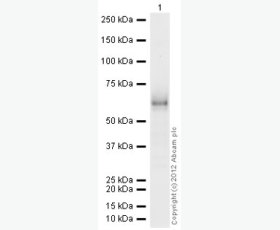Recombinant Human Aldo-Keto Reductase 1C3/AKR1C3
| Product name: | Recombinant Human Aldo-Keto Reductase 1C3/AKR1C3 |
| Source: | Human Cells |
| Purity: | Greater than 95% as determined by reducing SDS-PAGE. |
| Buffer Formulation: | Lyophilized from a 0.2 μm filtered solution of 20mM PB,150mM NaCl,pH7.4. |
| Applications: | Applications:SDS-PAGE; WB; ELISA; IP. |
| Storage: | Avoid repeated freeze/thaw cycles. Store at 2-8 oC for one month. Aliquot and store at -80 oC for 12 months. |
| UOM: | 100ug/50ug/200ug/1mg/1g |
| Source | Human Cells |
| Description | Recombinant Human Aldo-Keto Reductase 1C3 is produced by our Mammalian expression system and the target gene encoding Met1-Tyr323 is expressed with a 6His tag at the C-terminus. |
| Names | Aldo-Keto Reductase Family 1 Member C3, 17-Beta-Hydroxysteroid Dehydrogenase Type 5, 17-Beta-HSD 5, 3-Alpha-HSD Type II Brain, 3-Alpha-Hydroxysteroid Dehydrogenase Type 2, 3-Alpha-HSD Type 2, Chlordecone Reductase Homolog HAKRb, Dihydrodiol Dehydrogenase 3, DD-3, DD3, Dihydrodiol Dehydrogenase Type I, HA1753, Indanol Dehydrogenase, Prostaglandin F Synthase, Testosterone 17-Beta-Dehydrogenase 5, Trans-1,2-Dihydrobenzene-1,2-Diol Dehydrogenase, AKR1C3, DDH1, HSD17B5, KIAA0119, PGFS |
| Accession # | P42330 |
| Formulation | Lyophilized from a 0.2 μm filtered solution of 20mM PB,150mM NaCl,pH7.4. |
| Shipping |
The product is shipped at ambient temperature. |
| Reconstitution |
Always centrifuge tubes before opening. Do not mix by vortex or pipetting. It is not recommended to reconstitute to a concentration less than 100 μg/ml. Dissolve the lyophilized protein in ddH2O. Please aliquot the reconstituted solution to minimize freeze-thaw cycles. |
| Storage |
Lyophilized protein should be stored at < -20°C, though stable at room temperature for 3 weeks. Reconstituted protein solution can be stored at 4-7°C for 2-7 days. Aliquots of reconstituted samples are stable at < -20°C for 3 months. |
| Purity |
Greater than 95% as determined by reducing SDS-PAGE. |
| Endotoxin | Less than 0.1 ng/µg (1 IEU/µg) as determined by LAL test. |
| Amino Acid Sequence |
MDSKHQCVKLNDGHFMPVLGFGTYAPPEVPRSKALEVTKLAIEAGFRHIDSAHLYNNEEQVGLAI RSKIADGSVKREDIFYTSKLWSTFHRPELVRPALENSLKKAQLDYVDLYLIHSPMSLKPGEELSP TDENGKVIFDIVDLCTTWEAMEKCKDAGLAKSIGVSNFNRRQLEMILNKPGLKYKPVCNQVECHP YFNRSKLLDFCKSKDIVLVAYSALGSQRDKRWVDPNSPVLLEDPVLCALAKKHKRTPALIALRYQ LQRGVVVLAKSYNEQRIRQNVQVFEFQLTAEDMKAIDGLDRNLHYFNSDSFASHPNYPYSDEYVD HHHHHH
|
| Background | AKR1C3, is an enzyme which belongs to the aldo/keto reductase family. It is expressed in many tissues including adrenal gland, brain, kidney, liver, lung, mammary gland, placenta, small intestine, colon, spleen, prostate and testis. AKR1C3 catalyzes the conversion of aldehydes and ketones to alcohols. It catalyzes the reduction of prostaglandin (PG) D2, PGH2 and phenanthrenequinone (PQ) and the oxidation of 9-alpha,11-beta-PGF2 to PGD2,which functions as a bi-directional 3-alpha-, 17-beta- and 20-alpha HSD. It can interconvert active androgens, estrogens and progestins with their cognate inactive metabolites. |














